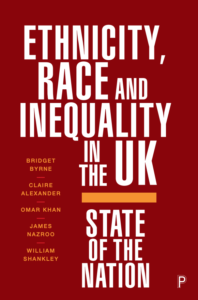Author: Eugene Ellis
A major new study has found that systemic and persistent racial inequalities in employment, health, housing and education, continue to blight the lives of ethnic minority people in the UK – and worryingly, this puts them at greater risk from the impacts of the Covid19 crisis.
The study, which was undertaken by researchers from The University of Manchester’s Centre on Dynamics of Ethnicity (CoDE) and the Runnymede Trust, found that:
• Ethnic inequalities in health outcomes, experiences of health care and employment in the NHS are substantial and have not changed over time.
• Disparities in educational outcomes show persistent disadvantage for Black Caribbean, Pakistani and Gypsy and Irish traveller groups, including significantly higher levels of permanent exclusion for Black and Gypsy and Irish traveller groups.
• Ethnic minority groups are disproportionately represented in the youth criminal justice system and in prison. Stop and search powers continue to be used disproportionately against ethnic minority groups – with black groups facing the highest rates.
• There is a sustained ethnic penalty in earnings suffered by Bangladeshi, Black and Pakistani groups. Discrimination in the paid labour market has, in part, led to high rates of self-employment for ethnic minority people.
• Recent immigration policies, including the ‘hostile’ or ‘compliant’ environment, have produced acts of discrimination and racism against ethnic minority groups as well as the injustices highlighted by the ‘Windrush scandal’.
The report’s six key recommendations call for:
1) The National Health Service to establish targets to reduce health inequalities and improve health outcomes for ethnic minority people. There should be clear action plans to achieve these targets.
2) The government to institute a formal review into race and the youth criminal justice system, including the additional powers granted to the police by the Corona Virus Act 2020.
3) The government to adopt a race equality strategy across all public policy areas. This strategy should be led by a senior minister who regularly attends and reports directly to the Cabinet.
4) The scrapping of ‘hostile environment’ immigration policies, including the monitoring of the right to work by private individuals and non-immigration specialist organisations, such as landlords, General Practitioners and teachers.
5) Employers with over 50 employees to monitor all hiring, promotion, disciplinary and pay decisions by ethnicity.
6) A government action plan to be initiated to tackle longstanding and persistent ethnic inequalities in education, particularly for Black Caribbean and Gypsy, Roma and Traveller children.


Thank you Eugene. As a ‘recently-joined’ Friend member of BAATN, I am really enjoying the rich source of information I am getting here. I’ve just looked inside this book on Amazon, and it looks like a real gem of a book and one that should be on the reading list in all Counselling and Psychotherapy institutes. I will recommend it to the Training Institute that I am a part of, and beyond.
Could someone please guide me to a support group. I’m struggling and desperately need to find an organization of BAME in my area North East Lincolnshire.
Hi Bibi,
Please have a look at our Free Services page which has a directory of services across different regions of the UK
Best wishes,
BAATN